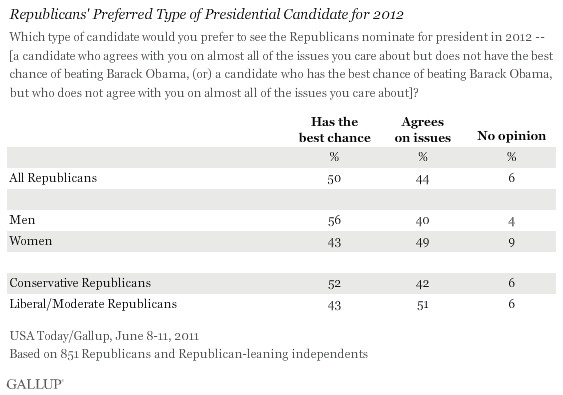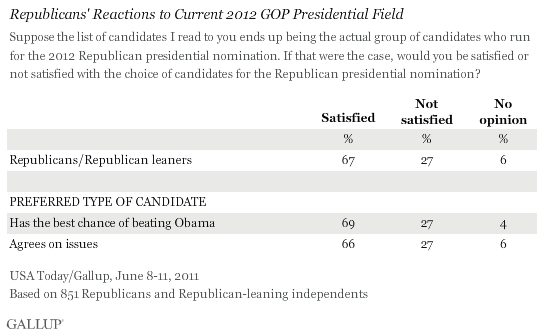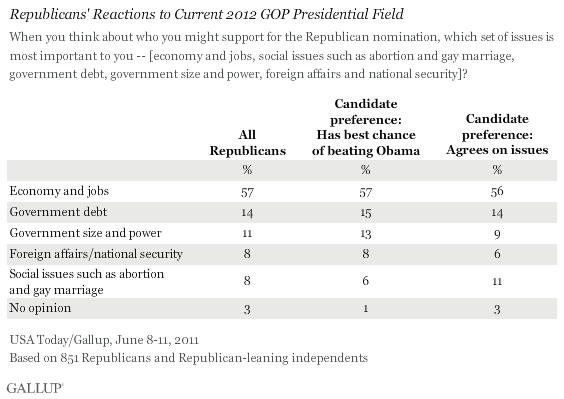PRINCETON, NJ -- Republicans nationwide are closely divided between those preferring that their party's 2012 presidential nominee be the person with the best chance of beating President Barack Obama and those favoring someone who shares their views on the issues they most care about. Given this choice, slightly more prioritize electability over issue agreement, 50% vs. 44%.

This sentiment appears to differ from what was the case leading up to the 2008 presidential election. Two Gallup polls conducted in late 2007 found the slight majority of Republicans saying issue agreement would be the more important factor to their vote, while about 4 in 10 chose electability.
The June 8-11, 2011, USA Today/Gallup poll, conducted with 851 Republicans and independents who lean Republican, shows Mitt Romney and Sarah Palin leading Republicans' vote preferences for 2012, with 24% and 16% support, respectively.
Among Republicans inclined to support the person best positioned to win next November -- so-called "strategic voters" -- Romney leads Palin 27% to 16%, followed by Herman Cain with 9%, Tim Pawlenty at 7%, Rick Santorum 6%, Ron Paul 5%, and Newt Gingrich and Michele Bachmann 4%. Among those choosing their candidate on the basis of issues, Romney garners 21%, Palin 14%, Paul 11%, Cain 8%, Gingrich and Bachmann 7%, Santorum 6%, and Pawlenty 5%.
Most Republicans Content With Current Field
Republicans are generally satisfied with the current set of candidates that Gallup considers likely contenders for the GOP 2012 presidential nomination, including Gary Johnson and Jon Huntsman, in addition to Romney, Palin, Cain, Paul, Pawlenty, Santorum, Bachmann, and Gingrich. Two-thirds, 67%, say they would be satisfied if this list ultimately represents the full group of candidates running for the nomination, while 27% say they would not be satisfied.
Notably, there is no difference in satisfaction with the field between Republicans who favor nominating the best candidate to beat Obama vs. those favoring someone who closely shares their views.

Economic Issues Paramount in Republicans' Minds
The same poll asked Republicans to say which of five broad issues will be most important to them in determining their vote for the Republican nomination. "The economy and jobs" swamps all others, with 57% of Republicans choosing it -- similar to the percentage of all Americans focusing on these in recent months as the nation's most important problems. Government debt comes in a distant second at 14%, followed closely by government size and power at 11%, with social issues and foreign affairs/national security tied for last, at 8% each.
Gallup finds little difference in this issue ranking between Republicans who prioritize electability vs. those who prioritize issue agreement as the chief criterion for selecting the nominee. The vast majority of both groups choose the economy and jobs.

Another positive finding for Romney from the new poll, in addition to his expanded lead over the rest of the field, is that he is the top choice of Republicans who say the economy and jobs is the most important issue to them: 24% of these Republicans favor Romney for the nomination vs. 16% choosing Palin, the same as his lead over Palin among all Republicans.
Bottom Line
Romney currently leads the GOP presidential field, and has an eight-percentage-point edge over Palin in second place. He also performs a bit better in several recently reported trial heats against Obama than do his Republican competitors.
Much of the political speculation about whether Romney can maintain his front-runner status and win the primaries, however, centers on his ability to convince primary voters that he is an authentic conservative -- in other words, one of them. The new USA Today/Gallup poll suggests that half of Republicans may be less concerned about Romney's conservative credentials than about how he compares with other GOP candidates in general-election trial heats against Obama. Furthermore, 7 in 10 predominantly issue-focused Republicans are primarily concerned about fiscal issues -- either the economy and jobs or government debt -- both of which may play to Romney's business background.
Romney will likely take some heat from his rivals on the campaign trail as he tries to reconcile his healthcare policies as governor of Massachusetts with his more recent criticism of President Obama's healthcare law, as well as explain his past positions on gay rights and abortion. However, in addition to enjoying a modest lead at this early stage of the campaign, Romney appears to have as much potential as Palin, Cain, and others -- if not more -- to expand his lead by appealing to Republicans on the issues as well as to their pragmatism about nominating the strongest candidate.
Survey Methods
Results for this USA Today/Gallup poll are based on telephone interviews conducted June 8-11, 2011, on the Gallup Daily tracking survey, with a random sample of 851 Republicans and Republican-leaning independents, aged 18 and older, living in all 50 U.S. states and the District of Columbia.
For results based on the total sample of Republicans, one can say with 95% confidence that the maximum margin of sampling error is ±4 percentage points.
Interviews are conducted with respondents on landline telephones and cellular phones, with interviews conducted in Spanish for respondents who are primarily Spanish-speaking. Each sample includes a minimum quota of 400 cell phone respondents and 600 landline respondents per 1,000 national adults, with additional minimum quotas among landline respondents for gender within region. Landline telephone numbers are chosen at random among listed telephone numbers. Cell phone numbers are selected using random-digit-dial methods. Landline respondents are chosen at random within each household on the basis of which member had the most recent birthday.
Samples are weighted by gender, age, race, Hispanic ethnicity, education, region, adults in the household, and phone status (cell phone only/landline only/both, cell phone mostly, and having an unlisted landline number). Demographic weighting targets are based on the March 2010 Current Population Survey figures for the aged 18 and older non-institutionalized population living in U.S. telephone households. All reported margins of sampling error include the computed design effects for weighting and sample design.
In addition to sampling error, question wording and practical difficulties in conducting surveys can introduce error or bias into the findings of public opinion polls.
View methodology, full question results, and trend data.
For more details on Gallup's polling methodology, visit www.gallup.com.
